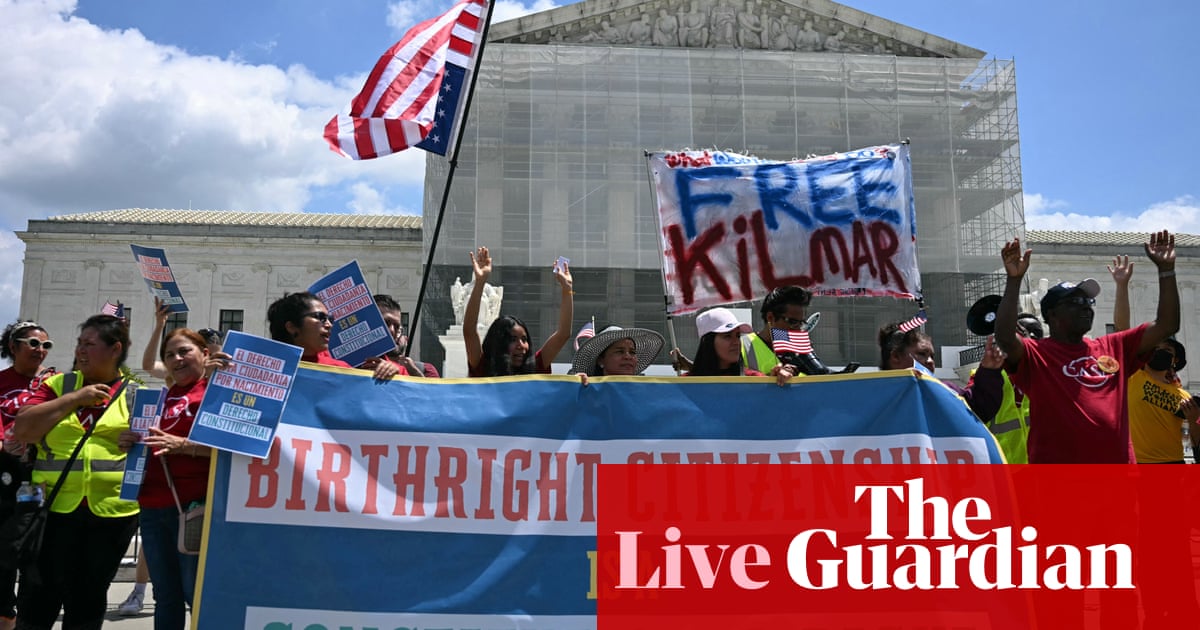Supreme court justices divided on whether to allow Trump’s birthright citizenship restrictions to take effect
The court’s liberal justices seemed firmly in support of the lower court rulings that found the changes to citizenship that Trump wants to make would upset the settled understanding of birthright citizenship that has existed for more than 125 years, the Associated Press reports.
Birthright citizenship is an odd case to use to scale back nationwide injunctions, Justice Elena Kagan said. “Every court has ruled against you,” she told solicitor general D John Sauer.
But if the government wins, it could still enforce the order against people who haven’t sued, Kagan said. “All of those individuals are going to win. And the ones who can’t afford to go to court, they’re the ones who are going to lose,” she said.
Several conservative justices who might be open to limiting nationwide injunctions also wanted to know the practical effects of such a decision as well as how quickly the court could reach a final decision on the Trump executive order.
Justice Brett Kavanaugh pressed Sauer with a series of questions about how the federal government might enforce Trump’s order. “What do hospitals do with a newborn? What do states do with a newborn?” he said.
Sauer said they wouldn’t necessarily do anything different, but the government might figure out ways to reject documentation with “the wrong designation of citizenship”.
Kavanaugh continued to press for clearer answers, pointing out that the executive order only gave the government about 30 days to develop a policy. “You think they can get it together in time?” he said.
The Trump administration has complained vehemently that judges are overreaching by issuing orders that apply to everyone instead of just the parties before the court.
Justice Sonia Sotomayor was among several justices who raised the confusing patchwork of rules that would result if the court orders were narrowed and new restrictions on citizenship could temporarily take effect in 27 states. Some children might be “stateless”, she said, because they’d be denied citizenship in the US as well as the countries their parents fled to avoid persecution.
New Jersey solicitor general Jeremy Feigenbaum, representing 22 states that sued, said citizenship could “turn on and off” for children crossing the Delaware River between New Jersey, where affected children would be citizens, and Philadelphia, where they wouldn’t be. (Pennsylvania is not part of the lawsuit).
One possible solution for the court might be to find a way to replace nationwide injunctions with certification of a class action, a lawsuit in which individuals serve as representatives of a much larger group of similarly situated people. Such a case could be filed and acted upon quickly and might even apply nationwide.
But under questioning from Justice Amy Coney Barrett and others, Sauer said the Trump administration could well oppose such a lawsuit or potentially try to slow down class actions.
Supreme court arguments over emergency appeals are rare. The justices almost always deal with the underlying substance of a dispute. But the administration didn’t ask the court to take on the larger issue now and, if the court sides with the administration over nationwide injunctions, it’s unclear how long inconsistent rules on citizenship would apply to children born in the United States.
Key events
US President Donald Trump marked his last scheduled night in the Middle East today. He has no other events planned this evening.
He finished the day walking out of the presidential palace in Abu Dhabi with UAE President Sheik Mohammed after dinner. They shook hands, and then Trump stepped into his limousine, per the Associated Press.
Once seated, he pumped his fist a few times and pointed at the UAE leader. Then the motorcade pulled away.
Trump announces over $200bn in deals with UAE, according to White House
Donald Trump announced deals totaling over $200bn between the United States and the United Arab Emirates, including a $14.5bn commitment between Boeing, GE Aerospace and Etihad Airways, the White House said.
We’ll have more details as soon as we get them.
The day so far
Trump’s executive order seeking to end birthright citizenship found no traction today at the supreme court, with justices taking issue at the attempt to sidestep the constitution … but the high court’s conservative majority did appear inclined to find ways to limit district judges from issuing blanket injunctions against federal policies, and to find other means for people to – in the short term – stop the policy. Doing that would allow the Trump administration to enforce the executive order in parts of the country where specific courts haven’t blocked it – which would in turn create a patchwork of different citizenship rules in different states while legal challenges continue. In the words of New Jersey solicitor general Jeremy Feigenbaum, who represented 22 states that sued, US citizenship could “turn on and off” across state lines.
Several of the conservative justices suggested that class-action lawsuits could replace the need for nationwide injunctions, while liberal justices said the two are conceptually different and argued that a class-action lawsuit wouldn’t protect people who hadn’t sued or couldn’t afford to from the order, as a universal injunction does. Justice Brown Jackson said allowing enforcement of the executive order would create a “‘catch me if you can’ kind of regime, where everybody has to have a lawyer and file a lawsuit in order for the government to stop violating people’s rights”.
In all, the liberal justices appeared firmly in support of the lower court rulings, while the conservatives appeared open to limiting nationwide injunctions, despite having questions about the practical implications of allowing Trump’s executive order to go into effect and whether the 30-day timeline in the EO makes sense for something as complicated as redefining citizenship.
The supreme court’s ruling, which will have profound implications for the Trump administration’s use of executive power to advance its agenda, extending well beyond immigration policy, is expected by the end of June or the beginning of July.
Also today:
Former House speaker Nancy Pelosi criticized Donald Trump for calling America “stupid” as she joined hundreds of protestors outside the supreme court. Trump had earlier called the US “stupid” for upholding the 14th amendment. Pelosi said: “No Mr President, America isn’t stupid. It’s the Constitution of the United States which all of us in elective office take an oath to protect and defend.” She added: “This is about birthright, it’s about citizenship, it’s about due process.”
Trump arrived in the UAE for day three of his Middle East tour aimed at drumming up investment in the US and securing lucrative economic deals with the Gulf nations.
Trump said he will “probably” return to Washington on Friday after a tour of three Gulf countries, although he said his destination is unknown as of yet. Trump earlier had hinted that he could stop in Istanbul for talks on Ukraine.
His secretary of state Marco Rubio echoed Trump’s earlier remarks that the only way a breakthrough will happen in the efforts to end Russia’s war in Ukraine would be through direct talks between the US president and Vladimir Putin after Moscow sent a second-tier team to talks taking place in Turkey. Rubio said he would travel to Istanbul for meetings on Friday with Turkey’s foreign minister Hakan Fidan and a Ukrainian delegation, but said he did not have high expectations for the talks.
The Trump administration said it will audit some $15bn in grants to power grid and manufacturing supply chain projects awarded during the Biden administration.
Trump administration to audit billions in energy grants awarded under Biden
The Trump administration said it will audit some $15bn in grants to power grid and manufacturing supply chain projects awarded during the Biden administration, Reuters reports.
Donald Trump has championed domestic production of oil, natural gas and coal while halting construction of an offshore wind farm and taking steps to ease regulations on fossil fuels. The Republican Trump administration last week proposed cutting billions of dollars in funding for projects including renewable energy and electric car chargers.
The DOE “has been hard at work reviewing the billions of dollars that were rushed out the door, particularly in the final days of the Biden administration, and what we have found is concerning,” energy secretary Chris Wright said.
Democratic former president Joe Biden’s energy department awarded billions of dollars in grants from the offices of grid deployment and manufacturing and energy supply chains.
The DOE will review materials including information companies had submitted in award applications and will ask companies for further information.
“If it is determined that projects do not meet Standards, DOE may modify the project or, DOE in its discretion, may terminate the project based on the outcome of DOE’s evaluation, as allowed by law,” said a memorandum issued by Wright.
“Any reputable business would have a process in place for evaluating spending and investments before money goes out the door, and the American people deserve no less from their federal government,” Wright said.
Bridget Bartol, who was a DOE deputy chief of staff during the Biden administration, said the move was harmful to projects that will increase energy supply. She said it seems the administration is trying to find a legally justifiable way to cancel projects it disagrees with.
The fact is awarded projects are extremely well vetted on a financial and technical basis. The vast majority of projects likely under review are aimed at building a stronger US industrial base, increasing electrons and building secure infrastructure.
The Department of Energy said it has begun requesting additional information to review the awards and is prioritizing large-scale commercial projects. The audit is in its initial phase and the energy department said the process may extend to other DOE program offices, which could mean putting billions of dollars worth of grants for other projects up for review.
Here’s our write-up of the supreme court hearing on the birthright citizenship dispute, from my colleagues Joseph Gedeon, Kira Lerner and Robert Tait in Washington.
Politico has some notable details from the state dinner attended last night in Doha by Trump and key figures from his administration.
The Qataris pulled out all the stops to commemorate Trump’s historic visit — this being the first official state visit to Doha by a US president, and the first state dinner hosted by the emir in honor of a US president. One person present at the dinner described two standout moments from the evening. The first was a big “happy birthday” shoutout from the president to White House chief of staff Susie Wiles. The Qatari orchestra then played “Happy Birthday” for her. The second was a performance from a surprise guest: The Qataris arranged for Lee Greenwood, one of Trump’s favorite singers, to attend and sing “God Bless the USA.
Even by the lavish standards of the events thrown by each of the nations Trump has visited during his Mideast trip, the Qataris’ decision to bring in Greenwood was a special touch. For Trump, it’s not just about cutting deals, it’s about garnering these sorts of grand performances of respect.
Marco Rubio had earlier echoed Trump’s earlier remarks that the only way a breakthrough will happen in the efforts to end Russia’s war in Ukraine would be through direct talks between the US president and Vladimir Putin after Moscow sent a second-tier team to talks taking place in Turkey.
Rubio, who spoke to reporters in Antalya, said he would travel to Istanbul for meetings on Friday with Turkey’s foreign minister Hakan Fidan and a Ukrainian delegation, but said he did not have high expectations for the talks.
It’s my assessment that I don’t think we’re going to have a breakthrough here until the president [Trump] and president Putin interact directly on this topic.
Trump says he’s ‘probably’ returning to Washington Friday but destination unknown
Donald Trump said earlier that he will “probably” return to Washington on Friday after a tour of three Gulf countries, although he said his destination is unknown as of yet, Reuters reports.
Trump earlier had hinted that he could stop in Istanbul for talks on Ukraine.
“We’ll be leaving tomorrow, as you know. Almost destination unknown – because they’ll be getting calls: ‘Could you be here? Could you be there?’ But probably going back to Washington DC tomorrow,” Trump said before signing the guest book at the royal palace in Abu Dhabi during his trip to the United Arab Emirates.
Supreme court justices divided on whether to allow Trump’s birthright citizenship restrictions to take effect
The court’s liberal justices seemed firmly in support of the lower court rulings that found the changes to citizenship that Trump wants to make would upset the settled understanding of birthright citizenship that has existed for more than 125 years, the Associated Press reports.
Birthright citizenship is an odd case to use to scale back nationwide injunctions, Justice Elena Kagan said. “Every court has ruled against you,” she told solicitor general D John Sauer.
But if the government wins, it could still enforce the order against people who haven’t sued, Kagan said. “All of those individuals are going to win. And the ones who can’t afford to go to court, they’re the ones who are going to lose,” she said.
Several conservative justices who might be open to limiting nationwide injunctions also wanted to know the practical effects of such a decision as well as how quickly the court could reach a final decision on the Trump executive order.
Justice Brett Kavanaugh pressed Sauer with a series of questions about how the federal government might enforce Trump’s order. “What do hospitals do with a newborn? What do states do with a newborn?” he said.
Sauer said they wouldn’t necessarily do anything different, but the government might figure out ways to reject documentation with “the wrong designation of citizenship”.
Kavanaugh continued to press for clearer answers, pointing out that the executive order only gave the government about 30 days to develop a policy. “You think they can get it together in time?” he said.
The Trump administration has complained vehemently that judges are overreaching by issuing orders that apply to everyone instead of just the parties before the court.
Justice Sonia Sotomayor was among several justices who raised the confusing patchwork of rules that would result if the court orders were narrowed and new restrictions on citizenship could temporarily take effect in 27 states. Some children might be “stateless”, she said, because they’d be denied citizenship in the US as well as the countries their parents fled to avoid persecution.
New Jersey solicitor general Jeremy Feigenbaum, representing 22 states that sued, said citizenship could “turn on and off” for children crossing the Delaware River between New Jersey, where affected children would be citizens, and Philadelphia, where they wouldn’t be. (Pennsylvania is not part of the lawsuit).
One possible solution for the court might be to find a way to replace nationwide injunctions with certification of a class action, a lawsuit in which individuals serve as representatives of a much larger group of similarly situated people. Such a case could be filed and acted upon quickly and might even apply nationwide.
But under questioning from Justice Amy Coney Barrett and others, Sauer said the Trump administration could well oppose such a lawsuit or potentially try to slow down class actions.
Supreme court arguments over emergency appeals are rare. The justices almost always deal with the underlying substance of a dispute. But the administration didn’t ask the court to take on the larger issue now and, if the court sides with the administration over nationwide injunctions, it’s unclear how long inconsistent rules on citizenship would apply to children born in the United States.
When will the supreme court justices rule on birthright citizenship dispute?
The supreme court is expected to issue a ruling on the government’s request before its term ends for summer recess, which is usually at the end of June or the beginning of July.
Meanwhile, in the Middle East, the UAE is keen on continuing to work with the US to achieve peace and stability in the region, president Sheikh Mohamed bin Zayed Al Nahyan told Donald Trump during a meeting at Qasr Al Watan in Abu Dhabi.
Justice Brett Kavanaugh suggests class action lawsuits could replace need for nationwide injunctions
CNN has more on Kavanaugh’s comments indicating he could be open to siding with the Trump administration.
Conservative Justice Brett Kavanaugh suggested that class certification would suffice for allowing the challengers to get broad relief from Trump’s executive order, and brushed away the arguments from a lawyer for those challengers that relying on class certification as a tool raises many of the same issues as nationwide injunctions.
Kavanaugh asked Kelsi Corkran, who was arguing on behalf of individual families facing loss of birthright citizenship:
Doesn’t class action solve the problem?
Corkran countered that, with that option, many of the concerns raised about nationwide injunctions – such as forum shopping and foisting emergency disputes on the supreme court, would still exist.
That point didn’t seem to sway Kavanaugh. While he didn’t disagree, he stressed that the class actions might be the technically appropriate way of approaching the dispute under existing court rules. “We care about technicalities,” he said.
Justice Ketanji Brown Jackson pushed back on the idea, touted especially by Kavanaugh, saying nationwide injunctions are doing a “conceptually different thing” than class actions.
Class actions give those covered within the class an enforceable right against the government, she said.
But such rights are not granted to people nationwide with nationwide injunctions, she said. Instead, those people are just benefiting from an order that requires the government to stop doing an unlawful thing, she added.
Vice-president JD Vance and secretary of state Marco Rubio to attend inaugural mass of Pope Leo XIV
Away from the supreme court hearing for a moment, it was announced earlier that JD Vance will lead a US delegation to Vatican City to attend the inaugural mass of Pope Leo XIV on Sunday.
The vice-president and second lady Usha Vance will be joined by secretary of state Marco Rubio and his wife Jeanette Rubio.
Trump’s executive order would allow US citizenship ‘to turn on and off’ over state lines, says New Jersey solicitor general
Per the Associated Press, New Jersey’s solicitor general Jeremy Feigenbaum described how the administration’s stance – that the birthright citizenship order should only be blocked in the places that sued – is unworkable.
He noted that people move to New Jersey from other states all the time. If they were born in a state where Trump’s order deprives them of citizenship and then move to New Jersey, they’d be eligible for benefits available to citizens but wouldn’t have been given the social security number required to access them.
Feigenbaum warned that never before in history has the country allowed “people’s citizenship to turn on and off” when you cross state lines.
Joseph Gedeon
Kelsi Corkran, the final lawyer of the day who is arguing on behalf of individual families facing loss of birthright citizenship, opens by saying the Trump order is “blatantly unlawful”. She cites the 14th amendment, common law, a century of precedent — and every court that’s looked at the issue.
She also defends the nationwide injunction blocking the order. The government claims courts can’t grant relief beyond the named plaintiffs. Corkran says they can, especially when fundamental rights and widespread harm are at stake.
This, she argues, is about preserving the legal status quo — not rewriting it.
Nancy Pelosi criticizes Trump for calling the US ‘stupid’ as she joins protesters

Robert Tait
Nancy Pelosi, the former House of Representatives’ speaker and one of several Democrats to address the rally, said Trump had called the US “stupid” in upholding the 14th amendment.
In response, she said:
No Mr President, America isn’t stupid. It’s the Constitution of the United States which all of us in elective office take an oath to protect and defend.
Quoting the constitution, she recited:
All persons born are naturalized in the United States and subject to the jurisdiction there are other citizens of the United States and the state wherein they reside, no state shall make or enforce any law which shall abridge the privileges of immunities, of immunities of citizens of the United States.
“This is important,” she continued, “because this is what’s going on in the court as well, or nor shall any state deprive any person of life, liberty or property without due process of the law, or deny any person within this jurisdiction the equal protections of the law. So this is about birthright, it’s about citizenship, it’s about due process.”
But she warned that members of Congress could only do so much to defend the constitution and called for a popular groundswell to express itself.
“The fact is that we can just do so much in the Congress, and [although] we are committed to do that, the outside mobilization is very, very important,” she said.
Justice Brown Jackson summarizes Trump administration’s argument as ‘catch me if you can’
Justice Ketanji Brown Jackson pressed Sauer on whether his opposition to a universal injunction in the citizen birthright case could lead to requiring every individual to file their own lawsuit in the case. She said:
The real concern, I think, is that your argument seems to turn our justice system, in my view at least, into a ‘catch me if you can’ kind of regime, where everybody has to have a lawyer and file a lawsuit in order for the government to stop violating people’s rights.
Sauer countered that Jackson’s“catch me if you can” system negatively impacts the administration, pushing them to battle every jurisdiction where cases could pop up. He said:
I think the ‘catch me if you can’ problem operates in the opposite direction, where we have the government racing from jurisdiction to jurisdiction, having to sort of clear the table in order to implement a new policy.



